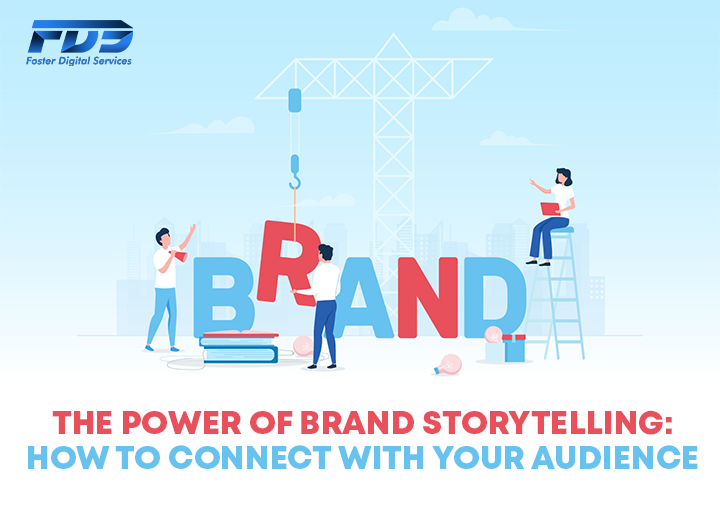The Power of Brand Storytelling: How to Connect with Your Audience
In today’s digital landscape, where brands compete for attention in a crowded marketplace, the power of storytelling has emerged as a potent tool for forging meaningful connections with audiences. Through compelling narratives and authentic messaging, brands can captivate the hearts and minds of their customers, building loyalty and trust that transcends transactional relationships. The Importance of Brand Storytelling At its core, brand storytelling is about more than just selling products or services; it’s about creating emotional resonance and fostering a sense of belonging among consumers. By sharing stories that reflect their values, mission, and culture, brands can humanize their identity and differentiate themselves from competitors. Understanding the Elements of Effective Storytelling Effective storytelling involves several key elements that work together to engage and resonate with audiences: Emotion: Emotions are the currency of storytelling, as they have the power to evoke empathy and connection. By tapping into universal human experiences such as joy, fear, or nostalgia, brands can create stories that resonate on a deep emotional level. Authenticity: Authenticity is essential for building trust with consumers. Authentic stories are honest, transparent, and aligned with a brand’s values and identity. When brands are genuine in their storytelling, they can forge stronger connections with their audience. Visuals: Visual storytelling can be incredibly powerful in capturing attention and conveying complex ideas in a simple and memorable way. Whether through images, videos, or infographics, visuals can enhance the impact of a brand’s narrative and make it more engaging for consumers. Audience-Centricity: Successful brand storytelling requires a deep understanding of the target audience and their preferences. By tailoring stories to resonate with specific demographics, brands can create content that feels personalized and relevant to the needs and interests of their customers. Crafting Compelling Brand Narratives To craft compelling brand narratives, brands should follow these best practices: Define Your Brand Story: Start by articulating your brand’s unique story, including its origins, mission, and values. What sets your brand apart from competitors What do you want your audience to know and make them feel about your brand? Identify Your Audience: Understand who your target audience is and what motivates them. What are their pain points, aspirations, and interests? Tailor your storytelling to address their needs and connect with them on a deeper level. Choose the Right Channels: Determine the best channels and platforms for sharing your brand stories based on where your audience spends their time online. Whether it’s social media, blogs, videos, or podcasts, choose channels that align with your brand’s voice and objectives. Be Consistent: Consistency is key to building brand recognition and trust over time. Ensure that your brand stories are aligned with your overall messaging and brand identity across all touchpoints. Case Studies in Effective Brand Storytelling Several brands have successfully leveraged storytelling to connect with their audiences and drive business results: Nike: Nike’s “Just Do It” campaign is a prime example of effective brand storytelling. By featuring real athletes overcoming challenges and achieving their goals, Nike inspires audiences to push their limits and pursue their passions. Dove: Dove’s “Real Beauty” campaign challenges traditional beauty standards by celebrating diversity and authenticity. Through real-life stories and testimonials, Dove empowers women to embrace their unique beauty and feel confident in their own skin. Airbnb: Airbnb’s “Belong Anywhere” campaign uses storytelling to highlight the transformative power of travel and cultural exchange. By showcasing the experiences of hosts and guests around the world, Airbnb fosters a sense of community and connection among its global audience. Coca-Cola: Coca-Cola’s “Share a Coke” campaign is a masterclass in personalized storytelling. By replacing its iconic logo with popular names and phrases, Coca-Cola encouraged consumers to share personalized bottles with friends and loved ones. This campaign not only drove sales but also fostered a sense of connection and community among consumers, who eagerly shared their Coke stories on social media. Patagonia: Outdoor apparel brand Patagonia is renowned for its commitment to environmental sustainability, and its storytelling reflects this ethos. Through initiatives like “Worn Wear,” which encourages customers to repair and reuse their clothing, Patagonia tells stories of adventure, resilience, and environmental stewardship. By aligning its brand narrative with its values, Patagonia has cultivated a loyal community of environmentally-conscious consumers who share its passion for conservation. LEGO: LEGO’s “Rebuild the World” campaign goes beyond selling toys to inspire creativity and imagination in children and adults alike. Through whimsical storytelling and playful visuals, LEGO showcases the endless possibilities of its building sets, encouraging fans to unleash their creativity and build a world of their own. By tapping into the universal desire for creativity and self-expression, LEGO has created a brand story that resonates with audiences of all ages. Conclusion Brand storytelling emerges as a potent force in fostering meaningful connections with audiences in the digital age. By harnessing emotions, authenticity, and audience-centricity, brands craft captivating narratives that forge profound bonds with consumers. To experience the transformative power of storytelling firsthand, explore our Foster digital services and embark on a journey to unleash your brand’s full potential. Delve into best practices and draw inspiration from successful case studies to drive unparalleled engagement, loyalty, and advocacy among your target audience. Ready to elevate your brand narrative? Contact Us Today
The Power of Brand Storytelling: How to Connect with Your Audience Read More »

